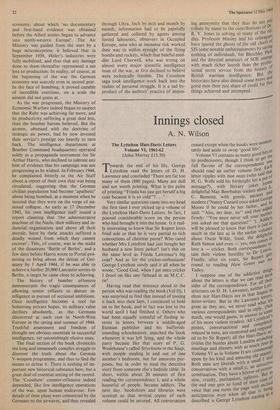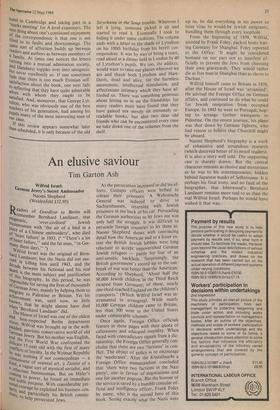Innings closed
A. N. Wilson
The Lyttelton Hart-Davis Letters Volume VI, 1961-62 (John Murray £13.50)
Towards the end of his life, George Lyttelton read the letters of D. H. Lawrence and concluded 'There are far too many of them (880 pages). Many are dull and not worth printing. What is the point of printing "Frieda has just got herself a big coat because it is so cold"?. .
Very similar questions came into my head the first time I ever picked up a volume of the Lyttelton Hart-Davis Letters. In fact, I poured considerable scorn on the person who had brought it into the house. Is it real- ly interesting to know that Sir Rupert loves fried sole or that he is very partial to rich concoctions of chestnut puree? Who cared whether Mrs Lyttelton had just bought her husband a new linen jacket? Isn't this on the same level as Frieda Lawrence's big coat? And as for the cricket-enthusiasm! George Lyttelton surely said it all when he wrote, 'Good God, when I get onto cricket I drool on like any fathead in an M.C.C. tie'.
Having read that sentence aloud to the person who was reading the book (Vol II), I was surprised to find that instead of tossing it back into their laps, I continued to hold on to the book, and in fact was lost to the world until I had finished it. Others who had been equally scornful of finding in- terest in letters between a middle-aged Etonian publisher and his bufferish- sounding schoolmaster, snatched the book whenever it was left lying, and the whole party became like that story of P. G. Wodehouse's called Strychnine in the Soup, with people stealing in and out of one another's bedroom, not for amorous pur- poses, but in order to steal the detective story from someone else's bedside table. In short, within about 20 minutes of first reading the correspondence I, and a whole houseful of people, became addicts. The next day, bookshops and libraries were scoured so that several copies of each volume could be secured. All conversation ceased except when the books were mown" tarily laid aside to swop 'good bits'.
Volume VI contains as many good bits as Its predecessors, though I think to get the full flavour of the correspondence D0nhe
gh e should read an earlier volume first. ':
letter ripples with bon mots (who said thf' H. G. Wells sold his birthrightjokes for a pot message?), with literary (sonic delightful Max Beerbohm triolets about C. Benson), with gossip, ancient an modern (`Nancy Cunard once asked George
i
Moore if he could be her father, and he., said: "Alas, my dear, no" and then addeu firmly: "You must never tell your in°t.lie,r Addici3 you asked me that question!" ')• will be pleased to know that there is just as, much in the last as in the earlier voluine', about Oscar Wilde, food, the delightful love it — cricket. Both corres Ruth Simon and even — yes, one comes 10 Leavls. tam their violent hostility to Finally, after six years, Sir Rupert gets, round to reading How Green was to}' Valley. I suppose one of the addictive thing! about the letters is that we can read inch sides of the correspondence. For all theta:. strictures on D. H. Lawrence, neither LYt s elton nor Hart-Davis are in that league 3 letter-writers. But in the Lawrence lettehrs; Pondents e great as they are, we never read what_(:t various correspondents said in replY• Oste much, one would guess, in answer to s0":„ of his more violent tirades). All Lytteltnrii), points, conversational and come d_ relaxed in tone, are countered and respono.... avis ed.to by Sir Rupert; all the Hart-D tivities (he bustles about London attend. in meetings and dinners with as much brio Volume VI as in Volume I) are comment: mast and upon by his kind and amusing old Both men are liberals with a small I a.vu_ conservatives with a small c, an attracteine. combination. They have a horror of Pret is sion, cruelty, puritanism, ugliness. But „.f the end one gets so fond of their tonetel"d voice that one turns the page with exci anticipation even when all that is bet a described is George Lyttelton staying 3 hotel in Cambridge and taking part in a `Marks meeting' for A level examiners. The nice thing about one's continued enjoyment of the correspondence is that one is not blind to its faults and shortcomings. The same sort of affection builds up between readers and authors as between members of a family. At times one notices the letters turning into a mutual admiration society, a. nd blandness topples over into smugness: but never repellently so. If one sometimes feels that there is too much Etonian self- satisfaction about the book, one next falls to reflecting that they have quite admirable selves with whom they ought to be satisfied. And, moreover, that George Lyt- telton, who was obviously one of the best teachers of his generation, had among his Pupils many of the most interesting men of our time.
If this review appears somewhat later than scheduled, it is only because of the old Strychnine in the Soup trouble. Wherever I left it lying, someone picked it up and started to read it. Eventually I took to hiding it under some cushions. The volume ends with a letter to the shade of Lyttelton on his 100th birthday from his bereft cor- respondent. It was by way of being a toast, read aloud at a dinner held in London by 40 of Lyttelton's pupils. We too, the addicts, would want to raise our glasses wherever we are and thank both Lyttelton and Hart- Davis, dead and alive, for the harmless amusement, intellectual stimulation, and affectionate intimacy which they have af- forded us. There was something generous about letting us in
on the friendship: for many readers must have found that they have gained not merely six extremely re- readable books, but also two dear old friends who can be encountered every time we take down one of the volumes from the shelf.







































 Previous page
Previous page